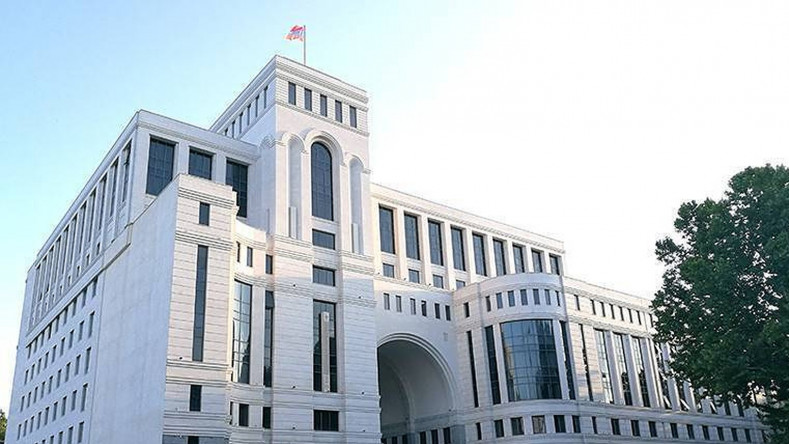
Armenian Foreign Ministry responds to Azerbaijan
Armenian Foreign Ministry spokesperson Ani Badalyan has again denounced Azerbaijan’s aggressive rhetoric, stating that the latest Azeri statements could include territorial claims against Armenia. Read her interview to Armenpress news agency below.
Armenpress: Ms. Badalyan, in response to your October 4 comments, the Azerbaijani Foreign Ministry spokesperson claimed that by studying the Armenian Constitutional Court’s decision regarding the regulation of joint activities of the border delimitation commissions of Armenia and Azerbaijan, they concluded that this decision “further underscores” the territorial claims against Azerbaijan in the Armenian Constitution. What would you say about this?
Ani Badalyan: The Constitutional Court's decision very clearly and directly says that only the provisions of the 1990 Armenian Declaration of Independence that are expressed verbatim in the Armenian Constitution’s articles have constitutional power. And therefore, it is not possible to attribute something to the Constitution that’s not written in the Constitution’s text that follows the preamble, meaning in the Constitution’s articles, and there simply is no place for any other interpretation, especially when the high court recorded that its previous decisions never recorded any other stance. Thus, the Armenian statehood’s fundamental principles and national goals mentioned in the preamble of the Armenian Constitution are those that are expressed in the subsequent text of the Constitution, and it contains nothing that is possible to interpret as a territorial demand directed against any country.
Armenpress: The Azerbaijani Foreign Ministry spokesperson claimed that other legal acts of Armenia also contain territorial demands against Azerbaijan.
Ani Badalyan: The Republic of Armenia has addressed this issue several times on the high and highest levels. Paragraph 3 of Article 5 of the Armenian Constitution stipulates that ratified international treaties have superior legal force over internal legislation. The wording of this article is the following: ‘In case of conflict between the norms of international treaties ratified by the Republic of Armenia and those of laws, the norms of international treaties shall apply.’
The agreed-upon part of the draft treaty On the Establishment of Peace and Interstate Relations between Armenia and Azerbaijan contains an article stipulating that the parties don’t have territorial demands against each other and are bound not to make such demands in the future. There is also an article that none of the parties can cite its internal legislation for failure to implement the peace treaty. Meaning, when the peace treaty is signed by Armenia and Azerbaijan, then receives a conclusion by the Constitutional Court about its compliance with the Constitution and then gets ratified by the National Assembly, it will gain higher legal force than any internal law. Therefore, the signing of the peace treaty will dispel all concerns of both Armenia and Azerbaijan regarding various legislative acts of the two countries, in case of such.
Armenpress: The Azerbaijani Foreign Ministry spokesperson also said that the commitment expressed by Armenia to the Almaty Declaration still doesn’t mean that Armenia doesn’t have territorial demands against Azerbaijan because the Almaty Declaration does not cover the issue about where the borders of CIS member states pass and which territories belong to which country.
Ani Badalyan: This comment is completely inappropriate because the 1991 December 21 Almaty Declaration clearly says that the parties recognize each other’s territorial integrity and the inviolability of the existing borders. Therefore, the signatory countries of the Almaty Declaration recognized the integrity of the de jure territories of Soviet republics at the time of the USSR collapse and the de jure existing inter-republican administrative borders as state borders. And these borders are well known, and the maps that reflect these borders exist in both Armenia and Azerbaijan. By the way, the wording of the peace treaty stipulating that the parties are bound to not have territorial demands against each other in the future dispel the claims made by Azerbaijan that Armenia has a “reserve option” for presenting territorial demands against Azerbaijan. While the comment on the Almaty Declaration made by the Azerbaijani Foreign Ministry spokesperson can actually mean that Azerbaijan itself has territorial demands against Armenia and is simply trying to create a smokescreen with accusations against Armenia.
Armenpress: The Azerbaijani Foreign Ministry spokesperson also claimed that Armenia is engaged in propaganda aimed at world leaders in the direction of opting out from the COP-29 in November in Baku. How would you comment on this?
Ani Badalyan: I would like to draw your attention on the fact that the Azerbaijani Foreign Ministry spokesperson did not anyhow respond to the questions I raised in my October 4 comments. The questions were the following: is Azerbaijan planning aggression against the Republic of Armenia? Is it refusing to recognize the territorial integrity of the Republic of Armenia, is it abandoning the peace agenda? Official Baku’s aggressive rhetoric and refusal to sign the peace treaty that includes the agreed-upon articles have made many Armenian and international experts conclude that Azerbaijan will use COP-29 to create a smokescreen for attempting to legitimize its future escalation of the situation. Moreover, the number of such analyses has been growing. Many analysts believe that ruling out such a prospect requires the signing of the agreed-upon content of the peace treaty ahead of COP-29, otherwise the leaders heading to Baku can unwittingly become instigators of war. In its turn, Armenia says it is ready to sign the peace treaty ahead of COP-29. I underscore that the Republic of Armenia endorsed the decision to hold COP-29 in Baku as an instrument of establishing trust between the parties and peace in the region, and we wouldn’t want it to be used for the opposite purpose.